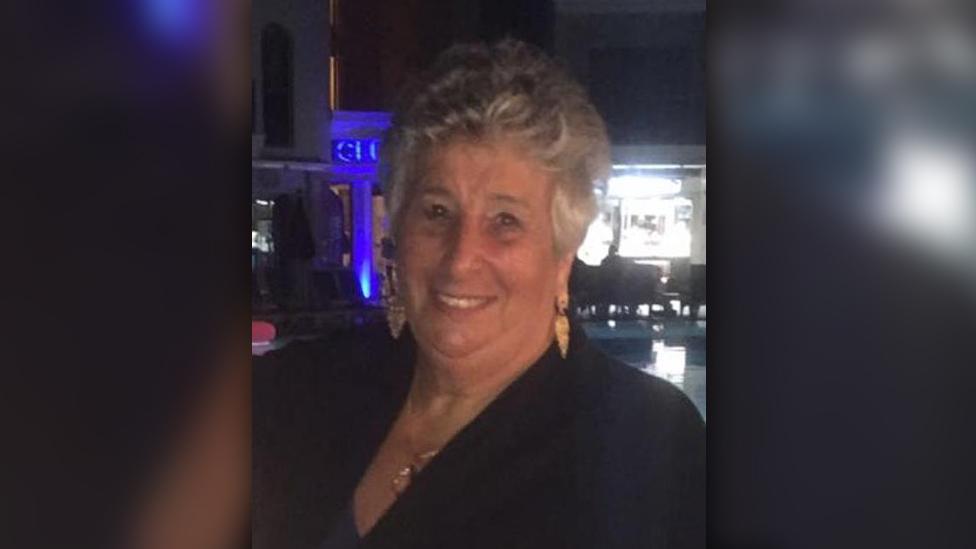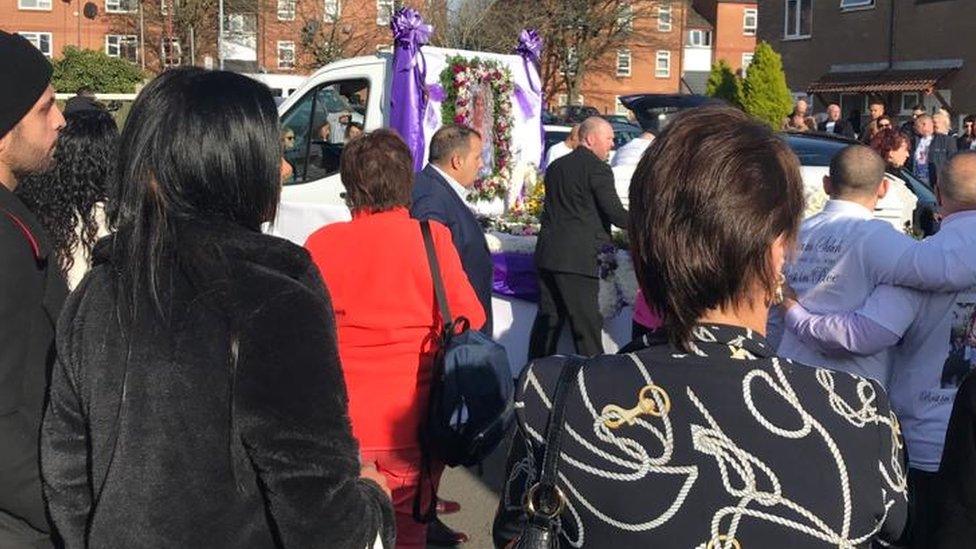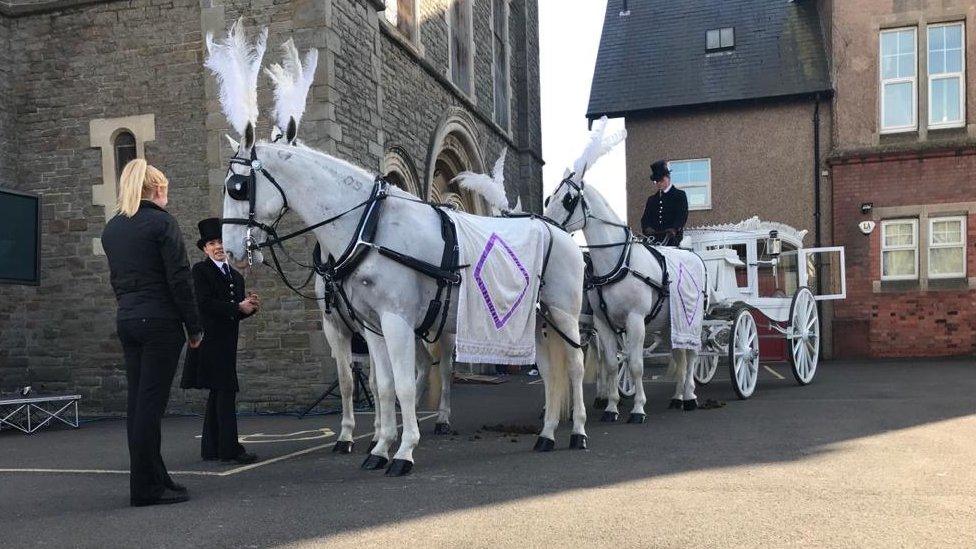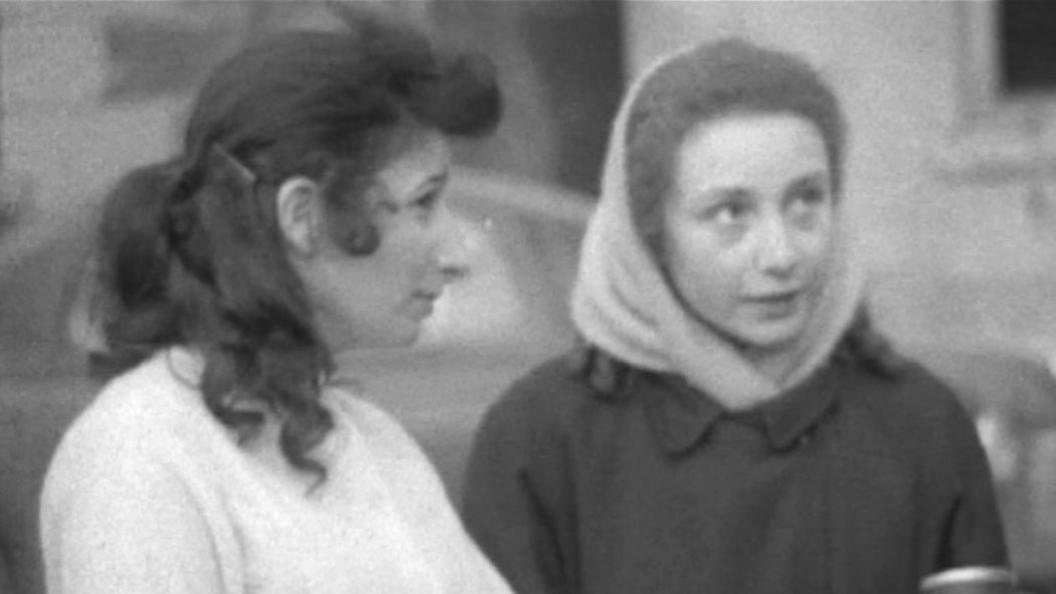Cardiff stops for funeral of Tiger Bay's Miriam Saleh
- Published
"She was our queen and a friend to so many others in the docks in their hour of need"
You would be forgiven for thinking that the once world-famous Tiger Bay had been consigned to the history books long ago.
For those currently living in the Welsh capital, the old Cardiff docklands community, credited by many as the birthplace of diversity and racial tolerance, is now largely the stuff of legends.
But Wednesday's extraordinary scenes on the streets of "the docks" - now rebuilt and rebranded Cardiff Bay - is a reminder that the spirit of old Tiger Bay burns bright.
A docks funeral - which literally stopped traffic around the capital - saw hundreds of mourners pour onto the streets amid a cacophony of steel and jazz bands to join the mile-long procession.
It marked the loss of a matriarch who many credit with embodying Tiger Bay. And tradition dictates that nothing about Tiger Bay funerals goes "gentle into that good night".
So for those who heard about the procession or witnessed the spectacle of her hearse carriage drawn by four white horses making its way across Cardiff to her resting place in Western Cemetery in Ely, may well be wondering "who was all that about?"
Her name was Miriam Saleh.

Miriam Saleh wanted people to wear bright clothing to her funeral to celebrate her life
Family and friends say Miriam - who died suddenly in her sleep at the age of 76 - had decreed many times exactly how her funeral should play out.
"She was our queen," said her son Norman Kaid, a retired train driver, "and a friend to so many others in the docks in their hour of need.
"Throughout her life she would feed anyone, take people in when they had nowhere else to go. She would take in and bring up many children over the years.
"When someone died, she was the first at the door. She would drop everything and drive to wherever - not only the docks but places Birmingham, Liverpool, London where she had many friends. 'So and so's died and the family are going to need my help', she'd say. And off she'd go.
"If someone had been taken ill and had to go to hospital leaving children at home, she'd be there. 'They're coming home with me,' she'd say.
"She more or less lifted their burden off other people and put it on herself. Her strength came through when it was needed most, at a time of other people's weakness.
"Growing up we had a massive extended family because everyone called her 'Auntie Mim' or 'Nana Mim'."
Miriam Saleh was interviewed by the BBC in 1962
The Tiger Bay funeral processions are as old as Cardiff itself - a city built around its once iconic docks; at one time the busiest and most prosperous in the world, the engine room of the industrial revolution, exporting coal from the Valleys across the world.
Like so many immigrant seamen, Miriam Saleh's father Bouback boarded a ship in his native Yemen around the turn of the 20th Century.
Docking in Tiger Bay, he settled in the bay's strong Yemeni community which melded with a kaleidoscope of some 50-plus nationalities, languages, customs and creeds.
He married Edith, a Cardiff girl. Miscegenation - as it was disapprovingly known back then - was commonplace in Tiger Bay.
Beyond the square mile confines of the bay - a bustling port with a reputation, like many others, for high crime and iniquity - the outside world for seamen's families was often disapproving, hostile and racist.

Miriam Saleh's coffin was driven through the streets of her home
There was often great hardship with seamen away for months on end and little money to be had. But if there were hungry children to be fed there was an open-door policy among the docks' terraces - a meal would always be found around someone's kitchen table.
Friends say Miriam Saleh had grown up watching her mother care for her own large family while still helping all manner of 'waifs and strays'; a tradition she was determined to continue.
"Miriam was a warm hearted kind person, who was always willing to help - anyone," said Gaynor Legall, a former Cardiff councillor for Butetown and a child care social worker in the area.
"That sometimes got her into difficulties, but if she liked you and thought you needed help, she was there."

Four white horses were used to draw the funeral hearse to take Miriam Saleh to her resting place
"Miriam was the life and soul. I can describe Miriam as a character once met she certainly will never ever be forgotten," her life-long friend solicitor Layla Attfield said.
"She had been a great friend of Betty Campbell, Wales' first black head teacher and another matriarch of the docks who died in 2017."
Paying tribute to his mother, Norman added: "She could make you laugh and cry. I say laugh, because she brightened up every place where ever she went, and I say cry, because she is now gone."
Miriam Saleh, mother to five sons, is survived by her elder sister Aleimar, aged 89, 19 grandchildren and nine great-grandchildren.
- Published10 April 2016
